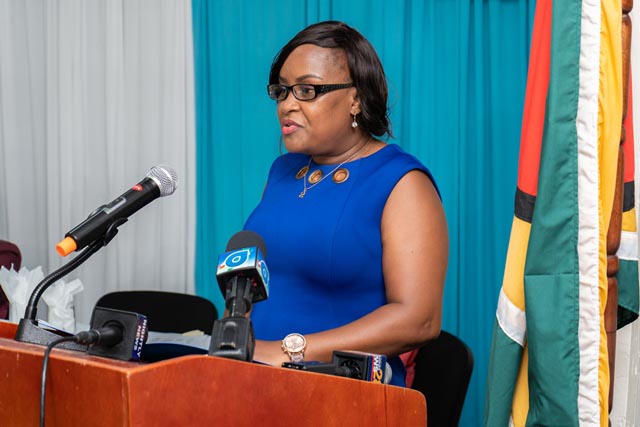As part of its 2021-2025 sector plan, the Ministry of Education’s (MoE) yesterday launched a National Risk Management Policy to mitigate the impact future disasters pose on the delivery of education.
The policy was launched at the National Centre of Educational Resource Development (NCERD) at Kingston, George-town.
The Assistant Chief Education Officer-Nursery (ACEO) Samantha Williams disclosed that planning for the policy commenced in September, 2020, and that a year later, following thorough analysis of each region, the policy is now being implemented. Williams added that the ministry took the challenges faced during the COVID-19 pandemic and all other natural disasters that affected the country into consideration when creating the strategic policy.
She explained that meetings were held with regional and international partners who aided in the policy development. It was noted that the ministry realised that it needed to prevent, prepare and respond to emergencies with a strategic education plan. This is to ensure that the MoE is better equipped to increase access to general education and to promote equity. Disasters such as bush fires, flooding, crop and pest disease, disease, pollution, and lack of infrastructure are among the things the policy will address. Williams elaborated on the work done from September 2020 to present and said that the Ministry and stakeholders were data-driven and acted based on evidence they collected through meetings and analysis.
The national risk management policy will see the prompt rehabilitation of the structure of educational facilities to ensure there is strategic procurement. It will support the distribution and establishment of digital infrastructure to support ICT, quality teaching, and learning. These factors will add to quality teaching and learning in a safe and conducive environment. The MoE, through this policy, will build teachers’ capacity and risk management as well as address psycho-social needs and learning loss. To ensure the policy is being carried out, there will be regional focal points that will be responsible for planning for risk management and communication will be a necessity.
It was further mentioned that the policy will protect the rights of children and allow for all children, regardless of their status in Guyana, to have access to education. Chief Education Officer Marcel Hudson said, “this policy takes into consideration the fact that the country operates in a global context and therefore provision was made to admit the migrant population into our school system so that they too may have the right to continue their education irrespective of their legal status or migration status guaranteed under international law on the basis of human rights, principals, equality and non-discrimination in times of crisis”. It was noted during the ceremony, that under the policy, teachers will be trained and that language barriers will be mitigated by having the teachers trained to speak the language of the children and vice versa.
According to Hudson, the policy is a “carefully thought out, critical input from stakeholders,” which caters for flooding, water pollution, noise pollution, bush fires and disease outbreak and the effects these conditions have on infrastructure. He noted that disasters cause persons to suffer from high levels of psychological distress and anxiety. Therefore, the Ministry is working to address the physical aspects and the psychological effects these disasters cause.
United Nations Children’s Fund (UNICEF) Area Representative to Guyana & Suriname Nicolas Pron and United Nations High Commissioner for Refugees, Senior Liaison Officer for Guyana, Cecilie Saenz Guerrero, commended the ministry for the initiative. According to Pron, the policy is a testimony to the ministry’s commitment and ability to predict and prepare. Further, the policy to have migrant children be allowed access to education regardless of their status is in keeping with the rights of children. The International Institute for Educational Planning (IIEP-UNESCO) and the Civil Defence Commission (CDC) will also be collaborating with the Ministry to carry out the policy training.





